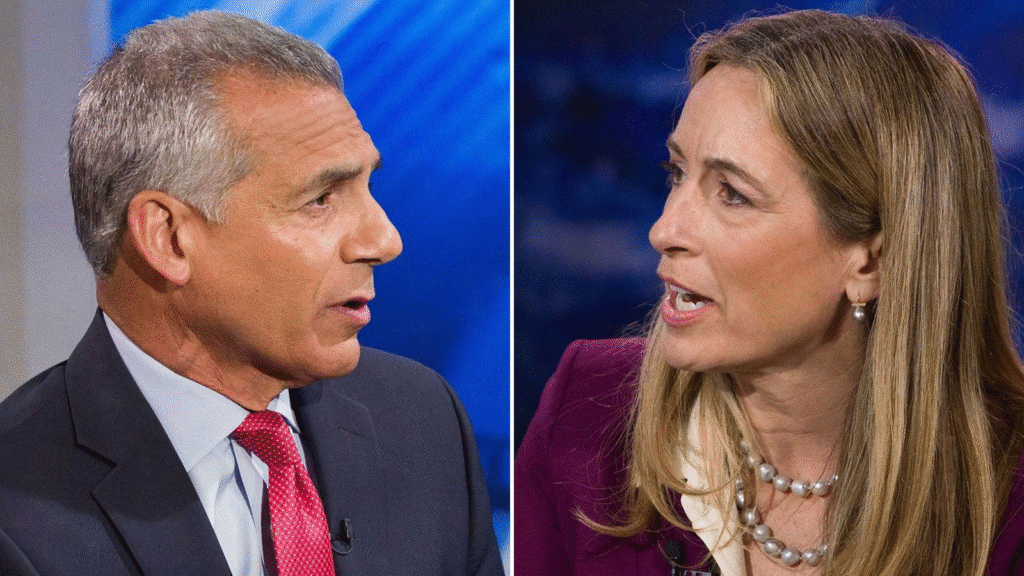Democrat Councilman Joins GOP and Endorses Jack Ciattarelli for Gubernatorial Campaign
In a major political shift
David Kupferschmid, a Democrat councilman in Bergen County, New Jersey, announced on Wednesday that he would be leaving the Democratic Party and endorsing Republican gubernatorial candidate Jack Ciattarelli.
Kupferschmid’s decision to flip parties marks a significant moment in New Jersey’s political landscape, reflecting broader national trends of shifting political allegiances as voters increasingly express dissatisfaction with their respective parties.
Kupferschmid, who was first elected to the Alpine council in 2023, became the latest Democrat in New Jersey to endorse the Republican candidate, joining a growing list of defectors from the Democratic Party.
Growing discontent within the Democratic Party
His announcement comes as the Democratic Party in New Jersey and across the country is facing increasing divisions and discontent, particularly among moderate and centrist members who feel alienated by the party’s leftward shift.
Kupferschmid’s decision to join the GOP is particularly noteworthy given the political makeup of Alpine, a small community in Bergen County. Alpine, with a population of just over 1,750, is the third-smallest community in the county, but its political dynamics are indicative of the larger shifts occurring in the state.
Historically, the community has leaned toward the Democratic Party, with Republicans having not held a seat on the council in over 20 years. Despite this, recent elections have seen Republican candidates, such as Ciattarelli and former President Donald Trump, making significant inroads in the area.
Republican resurgence in Alpine
Ciattarelli’s victory in Alpine during the 2021 gubernatorial race by 18 percentage points, coupled with Trump’s win in the area during the 2020 presidential election, shows that the Republican Party is gaining ground in traditionally Democratic areas.
Kupferschmid’s move is a response to what he sees as the growing irrelevance of the Democratic Party’s platform to the needs of local communities like Alpine.
In his statement, Kupferschmid explained his decision, saying:
“The Democrat Party does not represent us anymore. With my switch, I will now be the first Republican on the council in more than 20 years. I hope that this is the beginning of a resurgence for the Republican Party in Alpine, where alternate voices are much needed on the governing body.”
Kupferschmid’s remarks reflect a broader dissatisfaction with the direction of the Democratic Party, especially among local politicians who feel disconnected from the party’s national agenda.
A trend beyond Alpine
His decision highlights the struggle many centrist Democrats face as the party’s focus shifts increasingly toward progressive policies, leaving moderate voices feeling sidelined.
Kupferschmid’s defection is not an isolated incident. Elsewhere in Bergen County, more Democratic officials have made similar moves. Garfield Mayor Everett E. Garnto, Jr. also left the Democratic Party and endorsed Ciattarelli, reflecting a trend of political realignment in the county.
This shift is significant because Bergen County has long been considered a bellwether for New Jersey politics, often serving as a microcosm of the state’s larger political trends.
Bergen County swung to the right in 2024, signaling a potential shift in voter preferences that could have a major impact on future elections. With these changes in mind, the GOP is hoping to make significant gains in the upcoming gubernatorial race, and Ciattarelli’s ability to attract Democratic endorsements is seen as a key indicator of his potential to build a broad coalition.
Democratic defections gain momentum
In addition to Garnto’s endorsement, Ciattarelli has also gained support from other prominent Democratic figures in the state. Dover Mayor James P. Dodd and Garfield Deputy Mayor Tana Raymond, both former Democrats, have endorsed Ciattarelli, citing their desire for change and frustration with the direction of their party.
These endorsements are a sign that the Republican candidate is successfully reaching across the political divide and appealing to voters who may have previously identified with the Democratic Party but feel disillusioned by its current leadership.
Kupferschmid and others who have switched parties have voiced concerns over the national Democratic agenda, particularly the rise of far-left figures such as Zohran Mamdani, a pro-communist candidate for mayor of New York City.
Fear of radicalism within the Democratic ranks
Mamdani’s candidacy has raised alarm among moderate Democrats who fear that the party is becoming increasingly radical and out of touch with mainstream American values.
“The Democrat Party does not represent us anymore,” Kupferschmid said, referencing Mamdani’s rise in neighboring New York. “The rise of candidates like him is indicative of a broader shift in the party that has left many of us behind.”
For Kupferschmid, the ascension of figures like Mamdani represents a growing embrace of policies that he views as harmful to the nation’s future, particularly those that prioritize progressive ideologies over pragmatic governance.
Critics of the Democratic Party argue that its growing emphasis on issues such as defunding the police, climate change, and social justice reforms has alienated working-class voters and those who prioritize economic stability and national security.
Many of these voters, particularly in suburban areas like Alpine, have begun to view the Democratic Party as out of touch with their needs and concerns.
Ciattarelli’s pragmatic appeal
Ciattarelli, the GOP gubernatorial nominee, has positioned himself as a candidate who can bridge the divide between Republicans and disaffected Democrats.
His campaign has focused on pragmatic solutions to the state’s problems, including a commitment to reducing over-development and addressing crime—issues that have resonated with many voters in suburban communities.
“While Sherrill refuses to denounce the far-left radicals in her party, Jack Ciattarelli has been appealing to all sides with a common-sense message that includes putting the brakes on over-development and cleaning up crime, both of which are critical issues for Alpine,” Kupferschmid explained.
He emphasized the stark contrast between Ciattarelli’s approach and that of Democratic U.S. Rep. Mikie Sherrill, the incumbent gubernatorial candidate.
Ciattarelli’s focus on these practical issues has helped him gain traction among voters who are frustrated by the Democratic Party’s emphasis on national issues at the expense of local concerns.
A broader realignment
As Kupferschmid noted, Sherrill’s tendency to focus on national politics and her frequent efforts to link Ciattarelli to former President Donald Trump have alienated many voters, particularly those who are more concerned with the day-to-day issues that affect their lives.
Kupferschmid’s decision to switch parties is emblematic of a broader trend in New Jersey and across the United States, where moderates are increasingly seeking political homes outside of their traditional parties.
This shift is not limited to Republicans alone—Democrats in key states are also finding themselves disillusioned with the party’s leadership, particularly as more radical voices gain prominence.
What it means for New Jersey
In New Jersey, where Democrats have long dominated statewide and federal elections, the increasing number of defections to the Republican Party signals a potential realignment in the state’s political landscape.
If Republicans can successfully capitalize on this discontent and build a coalition of disaffected Democrats and independents, they could have a real chance at winning key races in the state, including the gubernatorial election.
Ciattarelli’s ability to attract moderate Democrats and independents is critical to his chances of winning the governorship. While New Jersey remains a largely blue state, the growing dissatisfaction with the Democratic Party’s direction could provide the opening that Republicans need to secure a victory.
The road ahead
Ciattarelli’s campaign has already gained significant momentum, thanks in part to endorsements from former Democrats and his appeal to moderate voters. However, his path to victory is not without obstacles.
The state’s large Democratic base and the continued popularity of President Joe Biden’s policies in New Jersey present challenges for any Republican candidate.
Nevertheless, the defections of local Democratic figures and the shift in political allegiances signal a potential shift in voter sentiment that could work in Ciattarelli’s favor.
Ciattarelli’s message of common-sense governance and his focus on local issues has resonated with many voters, particularly those in suburban areas who feel that their concerns have been overlooked by the Democratic Party.
His campaign’s ability to connect with these voters, while maintaining the support of traditional Republicans, will be crucial to his success in the upcoming election.
Conclusion
David Kupferschmid’s decision to flip parties and endorse Jack Ciattarelli represents a significant shift in New Jersey’s political landscape.
As the state’s political dynamics evolve, the growing number of defections from the Democratic Party to the Republican Party suggests that many voters are searching for a more moderate, pragmatic approach to governance.

If Ciattarelli can continue to attract these disaffected Democrats and build a broad coalition of support, he could make a serious challenge for the governorship in what has traditionally been a blue state.
The shifting political allegiances in New Jersey are a reflection of broader national trends, with voters increasingly dissatisfied with the direction of both major political parties.
As the state heads toward the 2024 gubernatorial election, it remains to be seen whether this shift will continue—and whether Republicans can capitalize on the growing discontent within the Democratic Party to achieve a significant victory in the Garden State.






